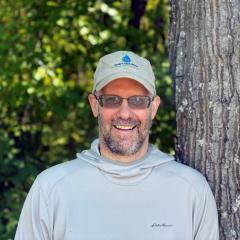Wisconsin-based scientist begins fellowship with Government of Kuwait
WISCONSIN – In his home state of Wisconsin, Supervisory Research Plant Geneticist Ron Zalesny is exploring the use of hybrid poplar and willow species and their use in cleaning contaminated soil and water. In Sept., he began a fellowship that will take him thousands of miles away from his native soil, literally and figuratively.
Zalesny started a 1-year fellowship to develop a comprehensive “Government of Kuwait Conservation Plan" to prevent desertification and remedy soil degradation. His primary activities will include assisting Kuwait in developing a strategy for conserving its desert terrain, thereby contributing to Kuwait’s United Nations Framework Convention on Climate Change Nationally Determined Contributions as well as U.S. Mission Kuwait’s Integrated Country Strategy environmental goals of combatting climate change and air pollution. The mission is administratively supported by the State Department and the Forest Service’s International Programs. The Embassy Science Fellow Program was planned to be both virtual and in-person, with Zalesny visiting Kuwait for 2-4 weeks, however all travel will depend on developments with the global pandemic.
Zalesny’s work will include assessing Kuwait’s land conservation efforts, which are currently spread across several Kuwaiti government agencies, and ultimately use this analysis to propose a comprehensive approach. This includes:
- Creating a literature review of existing research on Kuwait’s terrestrial surface and conservation efforts
- Meeting with conservation champions across Kuwait’s government, research institutions and non-governmental agencies to determine appropriate conservation goals
- Applying knowledge of desert soil conservation and desertification remediation to the planning process
- Assisting land management authorities with conceptualizing a comprehensive Government of Kuwait Conservation Plan.
“It’s a huge honor, and it’s both exciting and a little daunting,” Zalesny said. “I am looking forward to translating information from our Forest Service research into actionable science outcomes while developing international partnerships that will benefit urban and rural communities throughout Kuwait.”

